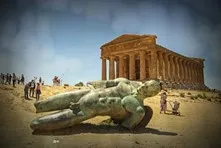From ancient temples to majestic ruins, Italy is a living museum, preserving the legacy of one of history’s most brilliant civilizations: the Roman Empire. More than just magnificent architectural structures, each site holds mythical stories of Roman gods, powerful figures who shaped the destiny of an entire empire. Join “Du lịch khắp thế gian” (Travel the World) to explore these legends, immersing yourself in the rich history and culture of Italy.
Discovering Pompeii: Where Myth Meets Reality
Pompeii, a city buried under the ash of Mount Vesuvius in 79 AD, is not only a priceless archaeological site but also a gateway to the spiritual world of ancient Romans. Here, you can encounter the bronze statue of Daedalus, the ingenious craftsman in Greek mythology and father of Icarus.
The story of Daedalus and Icarus serves as a reminder of hubris and the consequences of exceeding limits. Daedalus, a brilliant architect and sculptor, created wings from feathers and wax to escape the island of Crete with his son Icarus. He warned his son not to fly too close to the sun, but Icarus ignored his father’s advice, flew too high, and the wax melted, causing him to fall into the sea and perish.
Valley of the Temples: Testaments to the Power of Gods
The Valley of the Temples in Agrigento, Sicily, is a magnificent complex of ancient Greek ruins, dedicated to Greek gods who profoundly influenced Roman religion and culture. The temples here, despite thousands of years of history, still stand as testaments to the power and reverence of people for the gods.

The Temple of Concordia, one of the best-preserved temples in the Valley of the Temples, is a prime example of classical Greek architecture. This temple was built to honor Concordia, the Roman goddess of harmony and concord. The presence of the Temple of Concordia in the Valley of the Temples highlights the importance of maintaining harmony and stability in ancient Roman society.
Colosseum: Honoring Mars, the God of War
The Colosseum, an icon of the Roman Empire, is not only a grand architectural feat but also a stage for bloody battles and spectacular performances to honor the gods, especially Mars, the god of war.
Gladiators, brave warriors, fought to their last breath for glory and the favor of Mars. These battles were not merely entertainment but also a religious ritual, a way to appease the gods and ensure the prosperity of the empire.
Pantheon: The Temple of All Gods
The Pantheon, one of the best-preserved ancient Roman buildings, is a temple dedicated to all Roman gods. With its massive dome and the oculus at the top allowing natural light to flood in, the Pantheon is a symbol of the unity and power of the Roman gods.
The Pantheon is not just a temple but also a work of art, a testament to the talent and construction techniques of the ancient Romans. This temple has undergone many transformations throughout history, from a temple to Roman gods to a Christian church, yet it retains its beauty and majesty.
The Significance of Roman Gods in Daily Life
Roman gods were not just figures in mythology but also had a profound influence on the daily lives of ancient Romans. Each god had their own domain, from love and beauty (Venus) to war (Mars), wisdom (Minerva), and commerce (Mercury).
Ancient Romans believed that worshiping and appeasing the gods was essential to ensure prosperity, peace, and happiness for themselves and their community. They built temples, organized festivals, and performed rituals to honor the gods and implore their protection.
Conclusion
The mythical stories of Roman gods are not just ancient legends but also a vital part of Italy’s cultural heritage. When exploring the ancient ruins in Italy, we not only admire architectural beauty but also immerse ourselves in a colorful and meaningful mythological world. Let “Du lịch khắp thế gian” (Travel the World) guide you on a journey to discover these legendary stories, to better understand the history, culture, and soul of the ancient Romans.